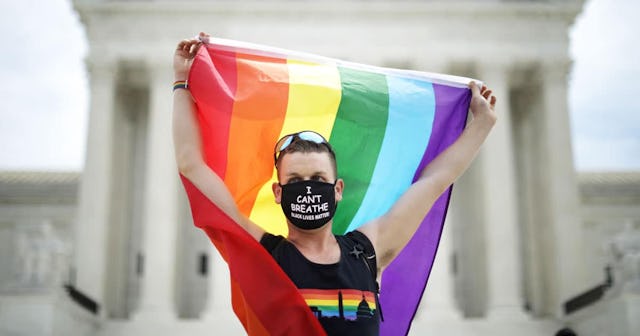We Can, And Should, Support Both Pride Month And The Black Lives Matter Movement -- Here's Why

June is Pride Month. Every month should celebrate LGBTQIA+ people and causes; however, that wouldn’t fit into most folks’ scope of awareness or businesses’ marketing plans. Am I jaded by the yearly rainbow-washing? Oh yes. Am I less proud to be part of the queer and transgender communities? No way. I honor the anniversary of the Stonewall riots that started the ongoing, now 51-year fight toward equity and equality each June too. I also know how progress is made; queer representation leads to queer rights. Pride Month adds to this.
Yet between COVID-19 and the recent, much-needed momentum of the Black Lives Matter movement, a parent in a private group for parents of transgender children asked if it was still okay to celebrate Pride this year. A friend had told her Pride needs to take a backseat.
SOPA Images/Getty
The answers were overwhelmingly in favor of celebrating, and fighting for, what we know is necessary. Highlighting the past and present stories of LGBTQIA+ people needs to happen and sometimes that means taking advantage of a calendar date. Not in spite of a pandemic or an uprising to end systemic racism, but because of them.
We don’t need to ignore one civil rights movement to focus on another, nor should we; the problem is that often folks can’t hold two things at once when it comes to the dehumanizing and discriminatory acts against those of us with much less privilege. The problems feel too big or too overwhelming to digest. News cycles make one problem seem more important than another and it almost becomes trendy to support a cause, especially when celebrities speak out against it.
FYI—I am NOT asking for cisgender actors to make a cringey video about their hopes, dreams, or responsibility for their part in the trash President’s decision to gut Sec. 1557 of the Affordable Care Act.
What I am asking is that people see the intersectionality of what is happening in our country right now. COVID-19 has disproportionately hurt both the LGBTQIA+ and Black communities. Systemic racism and police violence hurt and kill the queer community, specifically Black transgender women. Two Black transgender women, Dominique Rem’mie Fells and Riah Milton, were murdered this week, yet I don’t see people taking to the streets to protest and #saytheirnames. Is this because we don’t have video footage, or because they were transgender? The answer shouldn’t matter, but I know from experience it is because they were transgender. According to the Human Rights Campaign, they are the 13th and 14th reported murders of transgender folks in the U.S. this year. When we support the Black Lives Matter movement, that must include the lives of queer and transgender Black lives too.
We can’t forget about Pride any more than we can forget that Black people are being killed by cops. Now is the time to remember that Black and LGBTQIA+ people weave in and out of shared spaces. We have shared experiences through different lenses of bigotry, but there is more commonality than some may want to admit. Systems set up to benefit white people are also set up to benefit straight and cisgender folks. While there is a level of being able to “pass” to fit into the heteronormative narrative, I don’t want to, nor should any of us have to. My whiteness is a privilege; my queerness and my transness take some of that away. Now imagine being Black and queer.
SOPA Images/Getty
When I honor Pride, I also honor the fact that the riots at Stonewall were led by a Black transgender woman. As a nonbinary queer person, I honor the Black, queer activists through history that have fought for both civil and LGBTQIA+ rights, including Bayard Rustin, an advisor to Martin Luther King, Jr. Stormé DeLarverie was a butch lesbian, drag king, bouncer for lesbian bars in NYC, and held fundraisers that benefited women and children of domestic violence. James Baldwin was an author and activist. He worked to educate folks about the intersection of his Black and queer identity and provided a famous lecture called Race, Racism, and the Gay Community. I honor Miss Major, a transgender woman and fierce activist who speaks out specifically against the police system and the over incarceration of transgender people of color.
I honor Lori Lightfoot, Chicago’s first black female mayor and first openly queer mayor. I honor Laverne Cox, Billy Porter, Jason Collins, Lena Waithe, Wanda Sykes and all of the other celebrities who use their platform to advance LGBTQIA+ rights. There is an exchange of benefits that happens when groups support one another.
Pride offers us an opportunity to celebrate the intersection of Black and queer folks. It is another opportunity for the LGBTQIA+ community to show visible allyship to the Black community. There are over 1 million LGBTQ African Americans living in the U.S. according to the Williams Institute; this is roughly 3.7 percent of LGBTQ-identifying African Americans. Levels of privilege exist even in marginalized communities, and the most vulnerable people have been, and still are, queer people of color, specifically transgender people of color.
Pride can’t take a backseat this year because doing so would take away from the Black Lives Matter movement. As long as there have been humans, there have been queer humans — and that includes queer Black humans too. Now more than ever it is important to fight for both Black and LGBTQIA+ rights.
This article was originally published on